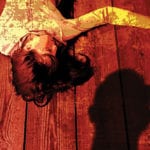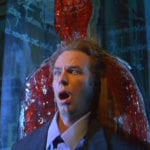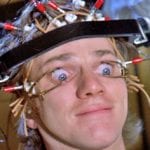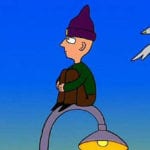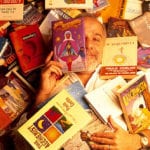 Movies and TV
Movies and TV  Movies and TV
Movies and TV  History
History 10 Wars That Sound Made Up (but Absolutely Happened)
 Movies and TV
Movies and TV 10 Movie Adaptations That Ruined Everything for Some Fans
 History
History 10 Dirty Government Secrets Revealed by Declassified Files
 Weird Stuff
Weird Stuff 10 Wacky Conspiracy Theories You Will Need to Sit Down For
 Movies and TV
Movies and TV 10 Weird Ways That TV Shows Were Censored
 Our World
Our World 10 Places with Geological Features That Shouldn’t Exist
 Crime
Crime 10 Dark Details of the “Bodies in the Barrels” Murders
 Animals
Animals The Animal Kingdom’s 10 Greatest Dance Moves
 Movies and TV
Movies and TV 10 Box Office Bombs That We Should Have Predicted in 2025
 Movies and TV
Movies and TV 10 Movie Franchises That Started Dark but Turned Surprisingly Soft
 History
History 10 Wars That Sound Made Up (but Absolutely Happened)
 Movies and TV
Movies and TV 10 Movie Adaptations That Ruined Everything for Some Fans
Who's Behind Listverse?

Jamie Frater
Head Editor
Jamie founded Listverse due to an insatiable desire to share fascinating, obscure, and bizarre facts. He has been a guest speaker on numerous national radio and television stations and is a five time published author.
More About Us History
History 10 Dirty Government Secrets Revealed by Declassified Files
 Weird Stuff
Weird Stuff 10 Wacky Conspiracy Theories You Will Need to Sit Down For
 Movies and TV
Movies and TV 10 Weird Ways That TV Shows Were Censored
 Our World
Our World 10 Places with Geological Features That Shouldn’t Exist
 Crime
Crime 10 Dark Details of the “Bodies in the Barrels” Murders
 Animals
Animals The Animal Kingdom’s 10 Greatest Dance Moves
 Movies and TV
Movies and TV 10 Box Office Bombs That We Should Have Predicted in 2025
Top 10 Books That Deserve Another Movie Adaptation
Despite pleas from movie-goers for studios to stop releasing remakes, they just keep being churned out. From an audience’s perspective, reboots rarely surpass the original, but they usually pay off financially for studios. But surely some movies deserve to be remade?
This is a list of 10 books that have previously been made into a movie but deserve another adaptation. Sometimes this is because the movie was unfaithful to the source material, while other times, it’s because the movie was just bad. Either way, the movies on the list are worth remaking.
Related: 10 Lies “Dracula” Adaptations Tell
10 The Day of the Triffids
John Wyndham’s The Day of the Triffids (1951) is a post-apocalyptic novel about plants called Triffids, which start killing and eating humans. It sounds like Little Shop of Horrors (1986) without the songs, but in Wyndham’s story, most of humanity is blinded by a meteor shower. This makes humans easy pickings for the Triffids, which, unlike Audrey II, are able to move around.
Hailed as a classic sci-fi novel, it was adapted into a film (in 1962) and two TV series (in 1981 and 2009), none of which do the story justice. It also partly inspired 28 Days Later (2002); they both start with the protagonist waking up in hospital to find that the world as they know it has ended. Unfortunately, the 1962 film is only a loose adaptation and weakly ends with the Triffid’s silver bullet being saltwater. The first BBC series is serviceable but dated, while the second is impaired by a bad script and bloated runtime. The Day of the Triffids is long overdue for a decent adaptation.[1]
9 Something Wicked This Way Comes
Something Wicked This Way Comes (1962) tells the tale of a sinister carnival that comes to town from the point of view of two boys, Jim Nightshade and Will Halloway. Ray Bradbury’s story is at once fantastical and dark, featuring a cast of characters such as the appropriately named Mr. Dark, the carnival’s leader, and the Dust Witch, a blind fortune-teller. Something Wicked is the perfect autumnal Halloween read, but the 1983 movie is not the perfect Halloween film.
Directed by Jack Clayton, produced by Disney, and with a screenplay by Bradbury himself, the movie is a worthy attempt at adapting the book but is ultimately lacking. It fails to replicate the haunting atmosphere which saturates the book. It is also missing several key scenes (likely because of the limitations of special effects at the time), particularly the scene where the Dust Witch searches for Jim and Will in a hot-air balloon. A modern, non-Disney, version would be better suited to capturing the book’s spookiness.[2]
8 The Dark Is Rising
It is a crime that a good adaptation of Susan Cooper’s The Dark Is Rising (1973), one of the best children’s fantasy books, has not been made. It is a bit like Harry Potter (1997), but darker, better, and written many years earlier. The book starts with just-turned-eleven-year-old Will Stanton learning that he belongs to an ancient order called the Old Ones. He then embarks on a quest to vanquish the evil magic of the Dark.
The book is beloved by children and adults alike, but the film version, The Seeker (2007), was critically panned (like 14% on Rotten Tomatoes bad). It lacks the heart of the book and oversimplifies and twists the meaning of the story. One reviewer accurately stated that “no one who loved those books could watch this travesty and not feel betrayed.” The Dark is Rising deserves another movie—one that remains true to the source material rather than warping it into a clumsy Christianized and Potter-ized mess.[3]
7 Journey to the Center of the Earth
Journey to the Center of the Earth (1864) by Jules Verne is another classic science fiction story. The title pretty much sums it up, but here’s the synopsis: a group of intrepid explorers descends into an extinct volcano toward (you guessed it) the center of the earth, where they find a subterranean world.
The story spawned many direct-to-DVD and TV movies, along with two major movies. The 1959 film is fun and silly but extremely dated. The 2008 film relies on tacky 3-D effects and falls short of the novel’s vision. While Brendan Fraser is a delight to watch (when isn’t he?) as the leader of the team, it feels like just a kid’s movie rather than a fun adventure story for all ages. There have already been so many bad attempts at adapting this novel; surely someone could have another go and get it right this time?[4]
6 Eragon
Initially self-published, Christopher Paolini’s Eragon was picked up by a publishing house in 2003. Despite being criticized for being derivative of Star Wars and The Lord of the Rings, the fantasy novel about a boy who finds a dragon egg spent 121 weeks on The New York Times Children’s Books Best Seller list. Only a few years later, in 2006, the movie version came out, but fans were sorely disappointed.
Everything about the movie, from the script to the acting to the character designs, was criticized. But recently, hope for a redo was ignited. When Disney bought 21st Century Fox, they acquired the rights to the books with failed adaptations like Rick Riordan’s Percy Jackson series and Eragon. Fan demand convinced Disney to green-light a reboot of Percy Jackson, and many people hope that the same can happen for Eragon. Despite online enthusiasm and the support of Paolini himself, Disney hasn’t announced anything—but hope springs eternal.[5]
5 30 Days of Night
So this is a comic book rather than a book-book, but it still counts for the purposes of this list. 30 Days of Night has a fantastic premise. Vampires being vulnerable to sunlight means there’s no better place for them to go than an Alaskan town so far north that during winter, the sun does not rise for 30 days. Steve Niles originally pitched the concept as a movie but, after being rejected, went down the comic book route. After the success of the 2002 comic, it was adapted into a movie with Josh Hartnett as the lead in 2007.
Ben Templesmith’s expressionistic art style spreads a feeling of dread across every page. The film fails to capture this creepiness. While it is filled with blood and jump scares, the vampires (which hiss a lot for some reason) are just not that frightening. Plus, by the end, it has morphed from a horror movie into an action flick. The film has gained a few defenders, but even they aren’t blind to how ridiculous the final showdown is.
Another adaptation could take the elements from the 2007 movie that worked (the gore, the feeling of isolation, the fact that it is a winter movie that actually feels like it was set during winter) but dispense with the silly action moments.[6]
4 I, Robot
Isaac Asimov’s short story collection I, Robot (1950) was incredibly influential, but the 2004 film of the same name has, for a good reason, faded from memory. Asimov’s book introduced the concept of “The Three Laws of Robotics,” which changed the conversation around the ethics of artificial intelligence.
The Will Smith-led movie took elements from the novel, like the name Dr. Susan Calvin and the Three Laws, and mashed them into an action movie with hordes of killer robots. While killer robots can be cool, they are not what I, Robot is about. There is far more of Jeff Vintar’s original screenplay hardwired in the movie than there is of Asimov’s short stories. This makes it feel like the movie was just capitalizing on the I, Robot name. The success of sci-fi movies like Ex Machina (2014) and Arrival (2016), which prioritize intelligent plots over punching things, proves that there is an appetite for the type of movie that a faithful adaptation of I, Robot could be.[7]
3 The Dark Tower
Many Stephen King movies could have made this list, but The Dark Tower (2017) is the worst case of expectations not meeting reality. King’s oroginal The Dark Tower series (1982-2004) is what you get if you put Westerns in a blender with The Lord of the Rings and Arthurian legend. The resulting mixture is often regarded as King’s magnum opus. There has long been demand from fans for the series to be adapted, but Nikolaj Arcel’s film is not what they had in mind.
Scoring only 16% on Rotten Tomatoes, the film was an utter failure. The story is condensed into just 95 minutes, not nearly long enough to build the intricate world established in the books. As a result, the movie is an incoherent mess that fails to satisfyingly tell the story of The Last Gunslinger and his pursuit of The Man in Black. It may be too soon for a new adaptation, with the bad taste of the 2017 movie still lingering, but this epic series deserves another shot in the near future.[8]
2 World War Z
Marc Forster’s 2013 film World War Z takes the title of Max Brooks’s 2006 book and nothing more. J. Michael Straczynski was hired to turn the book, which is made up of individual accounts which together form (as per the book’s subtitle) an oral history of the zombie war, into a movie. Straczynski’s vision clashed with Forster’s, though, with the screenwriter stating, “Marc wanted to make a big, huge action movie that wasn’t terribly smart and had big, huge action pieces in it,” which begs the question, “Why option this really elegant, smart book?”
Straczynski, unable to deliver Forster’s action-packed vision, was replaced with Matthew Michael Carnahan, who scrapped the interview style, i.e., the thing that made the book so interesting. The resulting movie sees Brad Pitt navigate through a brainless, CGI mess of a zombie world. A faithful adaptation of Brooks’s novel would combine thrills with interesting storytelling and feel like a breath of fresh air for the zombie genre.[9]
1 I Am Legend
Richard Matheson’s 1954 novel I Am Legend is a classic of both the horror and sci-fi genres, but no film has captured its brilliance. We follow Robert Neville, the last surviving human of a vampire plague, as he tries to develop a cure and, you know, not be killed by vampires.
The first adaptation, The Last Man on Earth (1964), starred horror movie legend Vincent Price. But combining these two legends was sadly not a success. Matheson contributed to the screenplay but was so disappointed with the movie that he used the pseudonym Logan Swanson in the credits. As a result, the movie is a mess, and the ending is butchered, with (spoiler alert) Neville (or Morgan in this version) failing to understand that, to the vampires, he is the legendary monster.
Next, Charlton Heston starred in The Omega Man (1971), which is so far removed from the book that it doesn’t deserve to be called an adaptation. Instead of vampires, we have a cult of mutants called The Family. The ending, once again, erases the novel’s twist by having Neville develop a cure and give it to a group of survivors before dying.
Lastly is the Will Smith blockbuster I Am Legend (2007), which spits in the face of the book. Smith’s Neville also develops a cure and then heroically commits suicide. It ends with a voiceover declaring Neville a legend for sacrificing himself for humanity, literally the opposite of the ending in the book. Can someone please make a good adaptation of Matheson’s dark masterpiece?[10]
